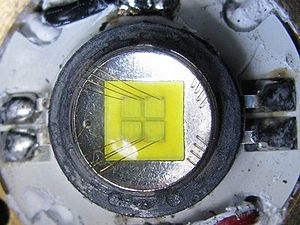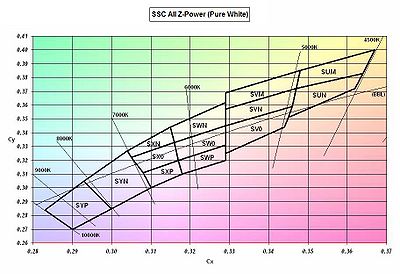Seoul Semiconductor
Seoul Semiconductor Co., Ltd. is a Korean company that produces LED's. Their P4 and P7 LED's are used in a number of flashlights.
P4 LED
The P4 uses Cree's EZ1000 die and has similar performance to the Cree XR-E LED. Do not confuse the Cree P4 bin (brightness) with the SSC P4 LED. The SSC P4 LED was much used as a "drop in" replacement for Lumileds Luxeon 3 LEDs. It gave about twice the output for about three times as long on the same battery and driver as a Luxeon 3. It had the same die height and beam pattern as the Luxeon 3 which the then new Cree LEDs did not. P4 web page
| Bin | 350mA | 1000mA |
|---|---|---|
| S1 | 54-60 | 127-141 |
| S2 | 60-70 | 141-165 |
| T1 | 70-80 | 165-188 |
| T2 | 80-91 | 188-214 |
| U1 | 91-100 | 214-235 |
| U2* | 100-109 | 235-256 |
| U3 | 109-119 | 256-280 |
P7 LED

The P7 is a multi-die LED utilizing four P4 LED's. P7 LED's have bin names that indicate brightness, color tint, and forward voltage. For instance a DSXOI bin indicates brightness level D, color SXO, and forward voltage of I. P7 web page
Brightness: Usually C or D where C is 700-800 lumens and D is 800-900 lumens (measured at 2.8 amps), but really there is some overlap where a low-end D might be less bright than a high-end C.
Color: A common cool white color bin is SXO, while SWO is more neutral, and SVN is neutral. See chart below for all of the SSC tint bins and color temperatures.
Forward voltage: I and J are common. I is 3.25-3.50V and J is 3.50-3.75V, again with some overlap possible.
The dies are manufactured for SSC by Cree, but the phosphor is SSC's own. Many prefer the P7 to the Cree MC-E which has the same dies but different phosphors and optics.
| Bin | 1400mA | 2800mA |
|---|---|---|
| A | 251-326 | 440-570 |
| B | 326-400 | 570-700 |
| C | 400-457 | 700-800 |
| D* | 457-514 | 800-900 |
| E | 514-629 | 900-1100 |
Tint bins

SSC does not use the ANSI White standard, but comparisons can still be made by using the color temperatures shown on the chart at the right. For more information on binning see the Binning and Labeling guides available at the product links listed above.